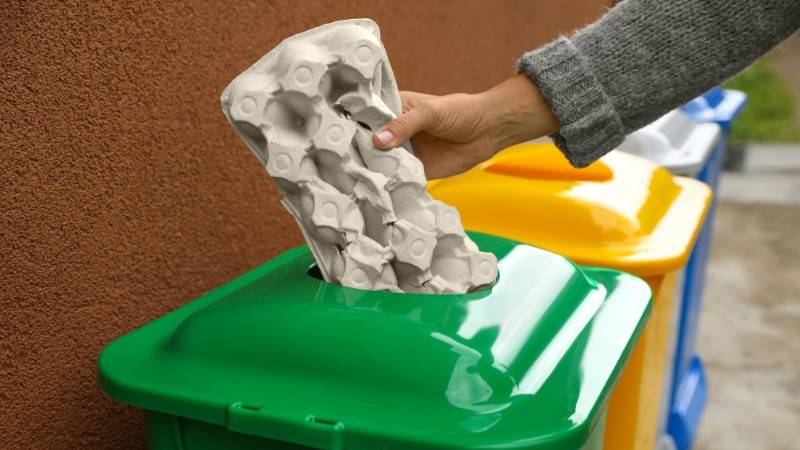Diving deep into the world of recycling, one can’t help but ponder on some of the everyday items we toss in the bin without much thought. One such debated item that has caught my eye is the humble egg carton.
Now, I get it – you’ve probably held a carton in your hand, staring at its construction, and wondered, “Are egg cartons recyclable?”
It’s a question worth its weight in sustainability gold.
From the commonplace cardboard egg cartons that we often doodle on, to the plastic egg cartons that seem pretty handy for those DIY projects, right up to the sturdy paper egg cartons – each type presents its own challenges and advantages in the recycling realm.
With the world gravitating towards greener choices, knowing what to do with these cartons becomes vital. So, let’s crack this topic open and find out more!
Can You Recycle Egg Cartons?
Egg cartons, with their unique, compartmentalized design, have been a staple in kitchens across the globe. Yet, every time we reach the end of a carton, the lingering question is, “Into which bin does this go? Are egg cartons recyclable?”
Yes, most egg cartons are recyclable, but it all depends on the material they’re made of. Dive into your local supermarket, and you’ll find that these cartons usually emerge from paper byproducts, #1 plastics, or Styrofoam.
While plastic egg cartons gracefully dance their way into the recycling bin, and paper cartons too find their way into many residential recycling carts, Styrofoam or foam remains the outcast. Not all recycling facilities accept Styrofoam egg cartons.
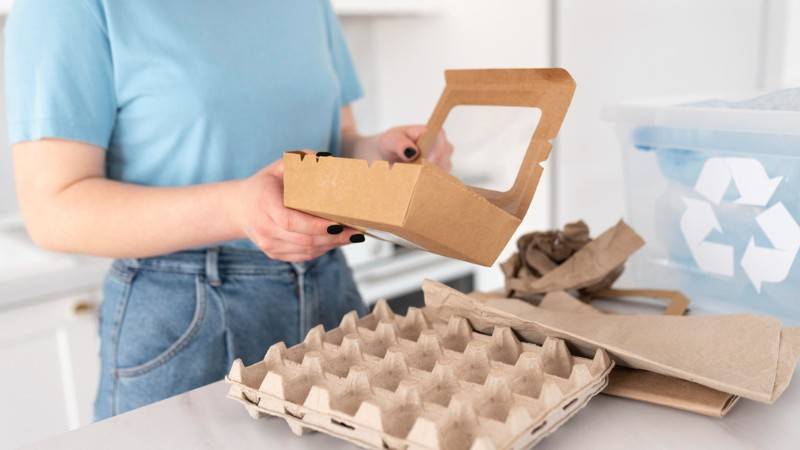
Paper/Cardboard Cartons: Recycling Process
Often made from recycled materials, including office paper and wood fibers, paper and cardboard egg cartons have become a favorite sustainable packaging material.
These cartons are primarily composed of paper products and wood fibers, making them a common choice for those who want to reduce waste.
You can follow these steps to recycle this type of egg cartons:
- First, the paper cartons need to be free from food residue.
- They are then broken down into smaller parts.
- Next, they undergo a process where fibers are separated and cleansed.
- The clean fibers are then reshaped into new recycled paper products, such as construction materials or even more egg cartons.
Styrofoam Cartons: The Recycling Dilemma
Styrofoam egg cartons, although lightweight and sturdy, come with their own set of recycling challenges.
These cartons are made from polystyrene foam, a type of plastic that can be problematic when it comes to recycling programs.
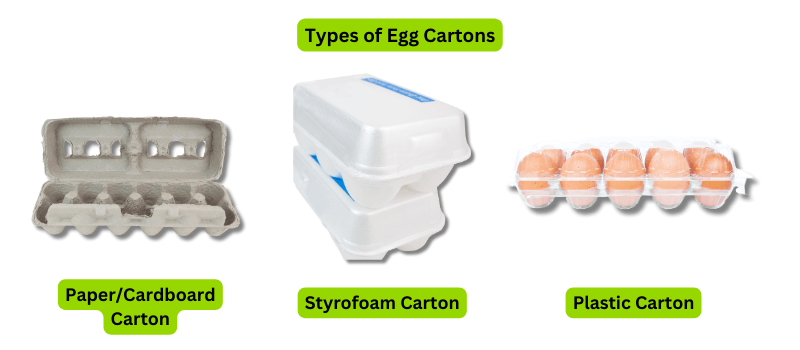
Styrofoam cartons are rarely accepted because recycling facilities find them hard to process. This is mainly due to the fact that they can’t be mixed with other plastic waste.
The good news is that you can recycle Styrofoam egg cartons or any kind of Styrofoam with Green Citizen. Check out our Styrofoam recycling services to get further information.
Plastic Cartons: The Good, The Bad, and The Ugly
Clear plastic egg cartons might seem like the modern touch our kitchens need, but they come with their own set of pros and cons.
Made mostly from #1 plastics, these cartons are the more recent, transparent alternative to their paper counterparts.
The good news is that many recycling facilities accept these as they’re made from commonly accepted plastic. They can be transformed into various products, from construction materials to even newer cartons.
Although many curbside programs might accept polystyrene, the sheer volume of plastic waste, combined with the complexity of different plastics, can sometimes hinder the recycling process.
It’s essential to always check with local recycling programs to understand which cartons they accept. By taking a moment to educate ourselves, we not only ensure our cartons end up in the right place but also contribute towards a sustainable future.

Read More:
Benefits of Recycling Egg Cartons
It’s easy to overlook those humble egg cartons once they’ve served their purpose. Yet, they are significant players in the sustainability arena. Recycling them not only puts a dent in the massive waste issue but also reaps multiple benefits for our environment and economy. Let’s hatch these benefits one by one:
Environmental Impact
Every time you pop an egg carton into the recycling bin rather than the trash, you’re taking a step forward in environmental conservation.
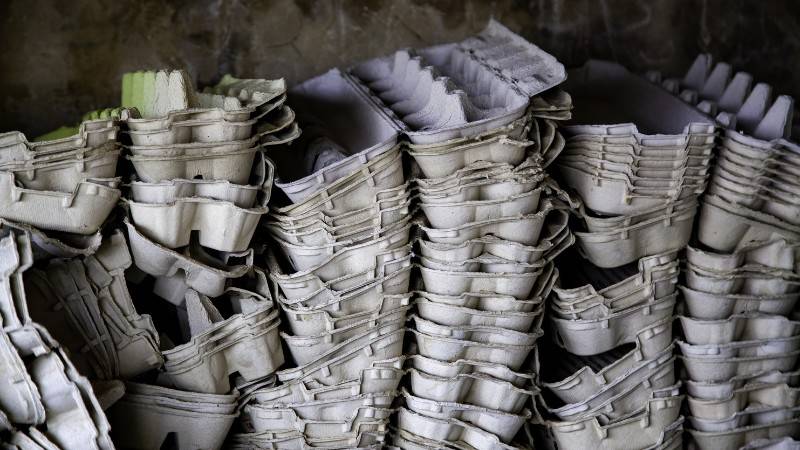
- Reduction of waste: Each recycled carton means one less item in our landfills. Given that we use egg cartons regularly, imagine the cumulative effect. It's not just about paper cartons but also those clear plastic egg cartons and cardboard egg cartons that can be broken down into smaller pieces and repurposed.
- Lower carbon footprint: Producing new materials, be it paper, plastic, or polystyrene, has a carbon cost. Reusing and recycling egg cartons means fewer raw materials are needed, thus conserving energy and reducing emissions.
- Eco-friendliness: Cardboard and paper cartons can be composted, becoming part of the earth again. They are biodegradable, making them an eco-friendly option over non-biodegradable materials.
Economic Implications
It’s not just about trees and turtles. Recycling egg cartons have economic advantages too!
- Cost savings for municipalities: Managing waste is expensive. When items like egg cartons are recycled instead of sent to a landfill, it reduces the volume of waste to manage. This can lead to significant cost savings over time.
- Business opportunities: With the growing focus on sustainability, businesses that produce recycled materials or products made from these materials have a unique market advantage. Think of the demand for recycled paper and cardboard, or the use of old plastic cartons to create new packaging.
Promoting Sustainable Practices
A culture of recycling can bring about a cascade of positive change.
- Role of consumers: Every time consumers choose to recycle, they signal to businesses the importance of sustainable practices. Whether it's deciding to recycle egg cartons or opting for eco-friendly packaging, consumers hold a lot of power.
- Driving sustainability in other areas: Recycling is a gateway to other sustainable practices. For instance, someone who starts with recycling might soon explore composting, or choosing products made from recycled materials over new ones. The ripple effect can't be ignored.
In a nutshell, those seemingly inconspicuous egg cartons can be mighty warriors in the battle for a more sustainable planet. By understanding their value and recycling potential, we can make choices that benefit both our environment and economy.
How to Reuse Egg Cartons
Before you send that egg carton to the recycling bin, take a moment to ponder: could it have a second life?
The reuse of items, from plastic egg cartons to cardboard ones, is a fantastic strategy to reduce waste and get creative in the process. Here’s how to breathe new life into your used cartons:
Composting Paper and Cardboard Egg Cartons
One of the most eco-friendly options for your paper and cardboard egg cartons is composting. These cartons, being biodegradable, can be a wonderful addition to your compost pile:
Break It Down: Start by tearing the carton into smaller pieces. This increases the surface area and helps it break down faster in the compost.
Add to Your Compost: Mix the torn carton pieces with other compostable materials, such as vegetable scraps, leaves, and grass clippings. The carton serves as a ‘brown’ component in composting, balancing out the ‘greens’ like veggie scraps.
Turn and Maintain: Over time, continue to turn and mix your compost. The carton pieces will decompose, adding rich nutrients to your mix.
Complete the Cycle: Once the composting process is complete, use it to enrich your soil. Your old egg carton will now nourish new plant life!
Repurposing Egg Cartons at Home
Beyond composting, egg cartons have a myriad of uses, from artsy endeavors to practical solutions.
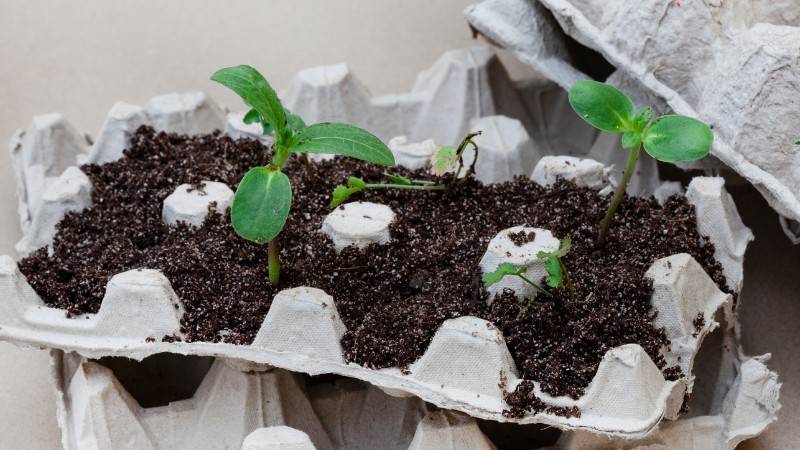
Here are some delightful ways to repurpose them:
- Craft Projects: Create quirky characters or imaginative scenes using both paper and plastic egg cartons. Great for school projects or just a fun weekend activity.
- Paint Palettes: Those little cups are perfect for doling out small amounts of paint for artwork.
- Science Projects: From showcasing rock collections to being a base for dioramas, the uses are endless.
- Transport Food: Planning to gift someone fresh eggs from a local farmer? An old carton is just what you need.
- Play Areas/Toys for Small Pets: These can be fun mazes or hiding spots for creatures like hamsters or gerbils.
- Jewelry Holders: Store earrings, rings, or other small items neatly.
- Drawer Organizers: Perfect for sorting screws, nails, or office supplies.
- Seed Starters for Plants: Fill with soil and plant seeds. Once they sprout, they’re ready for the garden.
- Storage for Holiday Lights/Decorations: No more tangled messes!
- Sewing Supply Holders: Keep threads, needles, and buttons sorted.
- Fire Starters: Stuff with paper or lint and use to start fires.
- Birdseed Holders: An easy way for birds to feed in your garden.
- Packaging/Shipping Materials: Provides cushioning for fragile items.
- Hardware Organizers: Never misplace a screw or nail again.
Egg cartons, whether made of paper, cardboard, or plastic, have an astounding array of potential second lives. So, the next time you’re about to toss one in the trash or recycling bin, remember these fun and practical reuse ideas!

Read More:
Frequently Asked Questions (FAQ)
While many cardboard egg cartons are recyclable, some might not be accepted due to contamination from food residue or if they’re coated with a thin layer of wax or plastic. Always check with your local recycling program.
Yes, paper-based egg cartons can be placed in paper recycling, provided they are clean and free from contaminants. If in doubt, it’s best to compost them or check with your local recycling facilities.
Egg cartons are typically made of pressed paper pulp, making them more similar to paper products. However, the term “cardboard” is often used colloquially to describe them, even though they’re technically not made from corrugated cardboard material.
Most paper-based egg cartons do not have a recycle code. However, plastic egg cartons should carry a recycling symbol, typically a #1 (PET) or #6 (polystyrene). Always check the bottom of the carton for specific recycling symbols.
Conclusion
In our journey to better understand the ins and outs of recycling, the topic of egg cartons has proven itself to be more than just a question of where to toss them post-breakfast. It’s a reflection of our collective responsibility towards the environment and the intricate decisions we make in our daily lives.
The importance of understanding the recyclability of everyday items, such as egg cartons, cannot be stressed enough. Every action we take, no matter how small, has a ripple effect on the planet. When we make informed decisions about recycling and reusing, we not only reduce waste but also contribute to a more sustainable future.
I encourage each one of you, my friends, to delve deeper into eco-friendly practices. Recycling is just one piece of the puzzle. By composting, reusing, and even repurposing items like egg cartons, we can make strides towards reducing our carbon footprint and making the world a greener place.
Remember, every carton counts. Let’s continue to educate ourselves and inspire those around us to participate in sustainable living. The earth thanks you, and future generations will too.

